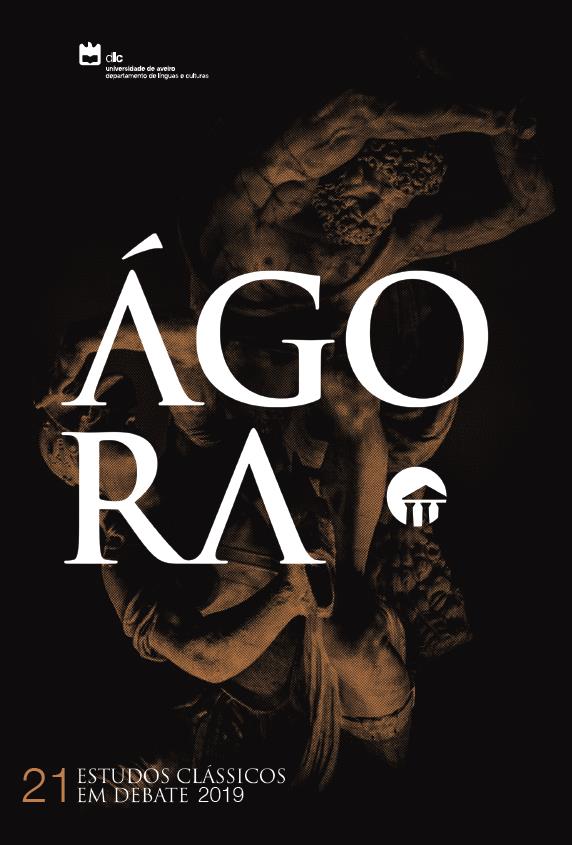Especulaciones rítmicas sobre un epodo de Arquíloco
Palavras-chave:
Arquíloco, epodos, epodo de Colónia, métrica grega antiga, trímetro iâmbico, dímetro iâmbico
Resumo
Neste trabalho realiza-se uma análise quantitativa dos versos do fr. 196a W de Arquíloco, o “epodo de Colónia 1” comparando-os com os versos conservados em outros fragmentos epódicos e em metro estíquio do mesmo poeta, com o objetivo de mostrar como se manipulam traços rítmicos para gerar e trair as espectativas do auditório. Esta análise é apresentada na terceira secção, depois de uma introdução geral à métrica dos epodos e de uma tradução do epodo de Colónia 1.
Downloads
Dados de Download não estão ainda disponíveis.
Referências
ABRITTA, A. (2017), “Modelos de la estrofa sáfica y el problema de la didáctica de la métrica griega clásica”: ponencia presentada en las IV Jornadas de Jóvenes Investigadores de la Antigüedad Grecolatina, Universidad de Buenos Aires, Agosto 2017, https://ubacyttorres.files.wordpress.com/2017/12/ modelos-de-la-estrofa-sc3a1fica-y-el-problema-de-la-didc3a1ctica-de-la-mc3a9trica-griega-clc3a1sica.pdf.
BOWIE, E. (1987), “One that got away: Archilochus 188-192 W and Horace, Odes 1.4 and 5”: M. WHITBY, P. HARDIE Y M. WHITBY (eds.) (1987) Homo Viator. Classical Essays for John Bramble. Bristol, Bristol Classical Press, 13 23.
DALE, A. M. (19682), The Lyric Metres of Greek Drama. Cambridge, Cambridge University Press.
DALE, A. M. (1969), Collected Papers. Cambridge, Cambridge University Press.
GENTILI, B., LOMIENTO, L. Y KOPFF, E. C. (2009), “Observations on Hephaestion Addressed to His Cultured Despisers”: QUCC 91 (2009) 123 128.
GRAHN, J. (2012), “Neural Mechanisms of Rhythm Perception: Current Findings and Future Perspectives”: Topics in Cognitive Science 4 (2012) 585 606
HAUSER, M. D., NEWPORT, E. L. Y ASLIN, R. N. (2001), “Segmentation of the speech stream in a non-human primate: statistical learning in cotton-top tamarins”: Cognition 78 (2001) B53-B54.
HURON, D. (2006), Sweet Anticipation. Music and the Psychology of Expectation. Cambridge, MIT Press.
ITSUMI, K. (2007), “What’s in a line? Papyrus Formats and Hephaestionic Formulae”: P. J. FINGLASS, C. COLLARD Y N. J. RICHARDSON (eds.) (2007) Hesperos. Studies in Ancient Greek Poetry Presented to M. L. West on his Seventieth Birthday. Oxford, Oxford University Press, 306-325.
IVERSEN, J. R. Y PATEL, A. D. (2008), “Perception of rhythm grouping depends on auditory experience”: The Journal of the Acoustical Society of America 124 (2008) 263-271.
LÉTOUBLON, F. (2008), “Archiloque et ‘«encyclopédie homérique»”: Pallas 77 (2008) 51-62.
MERKELBACH, R. y West, M. L. (1974), “Ein Archilochos-Papyrus”: ZPE 14 (1974) 97-113.
SAFFRAN, J. R. et alii (1999), “Statistical learning of tone sequences by human infants and adults”: Cognition 70 (1999) 27-52.
SICKING, C. M. J. (1993), Griechische Verslehre. München, C. H. Beck.
SLINGS, S. R. (1987), “Archilochus’ First Cologne Epode”: J. M. BREMER et alii (1987), Some Recently Found Greek Poems. Leiden, Brill, 24-61.
SNELL, B. (19825), Griechische Metrik. Göttingen, Vandenhoeck & Ruprecht [1º ed. 1955].
SWIFT, L. (2015), “Negotiating Seduction: Archilochus’ Cologne Epode and the Transformation of Epic”: Philologus 159 (2015) 2-28.
WEST, M. L. (1975), “Archilochus Ludens: Epilogue of the other editor”: ZPE 16 (1975) 217-219.
WEST, M. L. (1977), “Two Notes on the Cologne Epode of Archilochus”: ZPE 26 (1977) 44-48.
WEST, M. L. (19892), Iambi et elegi graeci ante Alexandrum cantati, vol. I: Archilochus, Hipponax, Theognidea. Oxford, Clarendon Press.
BOWIE, E. (1987), “One that got away: Archilochus 188-192 W and Horace, Odes 1.4 and 5”: M. WHITBY, P. HARDIE Y M. WHITBY (eds.) (1987) Homo Viator. Classical Essays for John Bramble. Bristol, Bristol Classical Press, 13 23.
DALE, A. M. (19682), The Lyric Metres of Greek Drama. Cambridge, Cambridge University Press.
DALE, A. M. (1969), Collected Papers. Cambridge, Cambridge University Press.
GENTILI, B., LOMIENTO, L. Y KOPFF, E. C. (2009), “Observations on Hephaestion Addressed to His Cultured Despisers”: QUCC 91 (2009) 123 128.
GRAHN, J. (2012), “Neural Mechanisms of Rhythm Perception: Current Findings and Future Perspectives”: Topics in Cognitive Science 4 (2012) 585 606
HAUSER, M. D., NEWPORT, E. L. Y ASLIN, R. N. (2001), “Segmentation of the speech stream in a non-human primate: statistical learning in cotton-top tamarins”: Cognition 78 (2001) B53-B54.
HURON, D. (2006), Sweet Anticipation. Music and the Psychology of Expectation. Cambridge, MIT Press.
ITSUMI, K. (2007), “What’s in a line? Papyrus Formats and Hephaestionic Formulae”: P. J. FINGLASS, C. COLLARD Y N. J. RICHARDSON (eds.) (2007) Hesperos. Studies in Ancient Greek Poetry Presented to M. L. West on his Seventieth Birthday. Oxford, Oxford University Press, 306-325.
IVERSEN, J. R. Y PATEL, A. D. (2008), “Perception of rhythm grouping depends on auditory experience”: The Journal of the Acoustical Society of America 124 (2008) 263-271.
LÉTOUBLON, F. (2008), “Archiloque et ‘«encyclopédie homérique»”: Pallas 77 (2008) 51-62.
MERKELBACH, R. y West, M. L. (1974), “Ein Archilochos-Papyrus”: ZPE 14 (1974) 97-113.
SAFFRAN, J. R. et alii (1999), “Statistical learning of tone sequences by human infants and adults”: Cognition 70 (1999) 27-52.
SICKING, C. M. J. (1993), Griechische Verslehre. München, C. H. Beck.
SLINGS, S. R. (1987), “Archilochus’ First Cologne Epode”: J. M. BREMER et alii (1987), Some Recently Found Greek Poems. Leiden, Brill, 24-61.
SNELL, B. (19825), Griechische Metrik. Göttingen, Vandenhoeck & Ruprecht [1º ed. 1955].
SWIFT, L. (2015), “Negotiating Seduction: Archilochus’ Cologne Epode and the Transformation of Epic”: Philologus 159 (2015) 2-28.
WEST, M. L. (1975), “Archilochus Ludens: Epilogue of the other editor”: ZPE 16 (1975) 217-219.
WEST, M. L. (1977), “Two Notes on the Cologne Epode of Archilochus”: ZPE 26 (1977) 44-48.
WEST, M. L. (19892), Iambi et elegi graeci ante Alexandrum cantati, vol. I: Archilochus, Hipponax, Theognidea. Oxford, Clarendon Press.
Publicado
2019-04-01
Secção
Artigos










